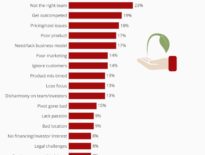
Get back to work.
I was asked recently, If a startup is turned down by an accelerator program, should the founders take it as a sign to move onto something else?
Taken back a bit, the popularity of the question astounded me. Is the acceptance of a startup program really that influential to some entrepreneurs?
What too many seem to fail to appreciate about incubators and accelerators is that they are businesses like any other. Like yours. They aren’t philanthropies. They aren’t panaceas for startups. They aren’t the great deciders of right and wrong. Most suck, as everything has an average; and half are below.
Though we look to them as important, and they are, and can be, half are worse than all the others, 70% are eh… And they’re all just trying to figure things out. Just like you.
As a business, they have a product/service, a market, and a customer.
Here’s the thing, though not necessarily obvious, the customer isn’t you.
You’re the product.
Incubators and accelerators serve sources of capital: sponsors, investors, grants, etc.
They do that within their market. That market is some distinction of location, industry, and stage.
As with any business, they must provide value to that market. They do so by being innovative and creating value for their stakeholders and customers therein – by developing and monetizing you.
Not with ill intent mind you! They’re in the business of developing entrepreneurs and startups so that they might be better valued. That’s what you want. That’s what our economy at large wants. And that’s what investors want. Simply, appreciate that while working with and for you, you aren’t the customer, you’re the product.
And you, the product, might not align with expectations of their customer. That hardly means that what you’re doing is a bad idea or that you aren’t worthy of that program.
Just as a grocery store would choose not to carry a product because it isn’t what their market buys, such programs aren’t judging you, they’re aligning WHAT you’re doing and WHY to the expectations of their market.
Why might they turn you down without it meaning anything about your potential?
- You don’t fit their market
- They don’t understand what you’re doing
- They don’t have time or resources
As a startup, you are going to be told no 90% of the time; by partners, potential advisors, customers, investors, potential employees, and more.
Frankly, if you are thinking you might throw in the towel because an accelerator tells you no, perhaps you should; not because they know better, they probably don’t know s***, but because being an entrepreneur is the hardest job in the world and it requires perseverance to deal with the overwhelming majority of NOs.
Should you take their rejection as a sign and move on from what you’re doing? No (see, there’s another no you can take to heart)



Keep going. As an entrepreneur you will get 100s of Nos before you get a yes. Thick skin, grit and perseverance are key to success. Keep going. Don’t give up.
Love this. Much needed, thank you.
Just brilliant! If you’re a founder you have to read this. If you are an incubator or accelerator you should disclose this.
“Is the acceptance of a startup program really that influential to some entrepreneurs?
What too many seem to fail to appreciate about incubators and accelerators is that they are businesses like any other. Like yours. They aren’t philanthropies. They aren’t panaceas for startups. They aren’t the great deciders of right and wrong. Most suck, as everything has an average; and half are below.
Though we look to them as important, and they are, and can be, half are worse than all the others, 70% are eh… And they’re all just trying to figure things out. Just like you.
As a business, they have a product/service, a market, and a customer.
Here’s the thing, though not necessarily obvious, the customer isn’t you.
You’re the product.
Incubators and accelerators serve sources of capital: sponsors, investors, grants, etc.
They do that within their market. That market is some distinction of location, industry, and stage.” – Paul O’Brien
Keep going until you find an incubator or accelerator that’s above the “70% eh”. They’re out there, and as an entrepreneur it’s up to you to find and ‘accept’ them.
#duediligence #founders #startups #incubators #accelerators
I got fed up enough with the players in the field that I set out to field a new one! Thanks for sharing Simone Stewart. Happy to say our first cohort is thrilled with what we did differently than the most.
Paul O’Brien “Players” …could not be a more accurate term for many in the startup space.
Startup is rooted in failure culture – figure out what was wrong and reiterate. When turned down by an incubator it’s important to understand why exactly and perhaps that feedback missing is the most frustrating part. But again, real world is no different and there is no cookie cutter solution 🙂
Well said; though I might shade your perspective that startups are rooted in failure culture. They’re rooted in tenacity to overcome failure efficiently and effectively; founders who fail that will fail as entrepreneurs.
Paul O’Brien thanks for pointing it out. It opens up another conversation about the thin line between tenacity and stubbornness.
Great direction On point. I have been rejected more times than an X Factor wannabe. Take the rejection and qualify the feedback. If it comes from someone you truly respect, understand it and take it onboard. I’ve seen plently of decision makers in incubators who couldn’t melt a chocolate bar in an inferno. Stick to your gut instinct, take relevant feedback and be so good they can’t ignore you.
Brilliant and wise observation Ciara; particularly the last part (sage advice about raising capital too)
Keep building! Accelerate yourself by talking to potential customers and get them to pay the read a books, listen to some podcast, and YouTube businesses growth videos. The answers are there.